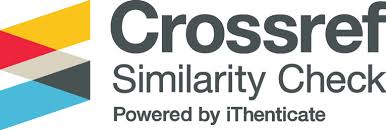Pengaruh Persepsi Manfaat, Persepsi Kemudahan dan Persepsi Resiko Terhadap Keputusan Penggunaan Go-Pay
Abstract
This research was conducted with the aim of looking at the effect of perceived benefits, perceived convenience, and perceived risk on the decision to use Go-pay among students at the Hindu University of Indonesia. The sample used in this study was 97 students, out of 3175 students at the Hindu University of Indonesia determined by purposive sampling method. The data analysis techniques used in this study were validity, reliability, classical assumptions, multiple linear regression, coefficient of determination, t test and F test. Based on the results of the study, it can be seen that: Perceived benefits, perceived convenience, and perceived risk have a positive and significant effect partially and simultaneously on the decision to use Go-pay. The magnitude of the influence of the independent variable on the decision to use Go-pay is 99.2%. The suggestion that Go-Jek hopes is to increase its usefulness for consumers by improving the quality of application features, and lowering administrative costs for consumers who want to use it.
References
Abidin, Muhammad Sofyan.(2014). Dampak Kebijakan E-Money Di Indonesia Sebagai Alat Sistem Pembayaran Baru. Igarss 2014, no. 1:1–5.
Adiyanti, Arsita Ika.(2015). Pengaruh Pendapatan, Manfaat, Kemudahan Penggunaan, Daya Tarik Promosi, Dan Kepercayaan Terhadap Minat Menggunakan Layanan E-Money (Studi Kasus : Mahasiswa Universitas Brawijaya). Jurnal Ilmiah 2 (1):4–6.
Ajzen, I., (1985), From intention to actions : a Theory of Planned Behavior, in Action Control: From Cognition to Behavior
Cahyo, W. S. (2014). Pengaruh Persepsi Kebermanfaatan, Keamanan,Kepercayaan Dan Persepsi Kemudahan Penggunaan Terhadap Penggunaan Online Banking Pada Mahasiswa S1 Fakultas Ekonomi Universitas Negeri Yogyakarta. Universitas Negeri Yogyakarta.
Ghozali, I., & Latan, H. (2015). Partial Least Squares: konsep, teknik dan aplikasi menggunakan program SmartPLS 3.0 (2nd ed.). Semarang: Badan Penerbit Universitas Dipenogoro Semarang
Hidayati, Siti, Ida Nuryanti, Agus Firmansyah, Aulia Fadly, and Isnu Yuwana Darmawan. 2006. Operasional E-Money.Bank Indonesia, 1–5.
Hussein, Ananda Sabil. (2015). Penelitian Bisnis Dan Manajemen Menggunakan Partial Least Squares (PLS) Dengan SmartPLS 3.0. Modul Ajar, 1–29.
Indriastuti, Maya, and Rizki Herdian Wicaksono. (2014). Influencers E-Money in Banking Sector. South East Asia Journal of Contemporary Business, Economics and Law 4 (2):10–17.
Istiarni, Panggih Rizki Dwi. (2014). Analisis Pengaruh Persepsi Manfaat, Kemudahan Penggunaan Dan Kredibilitas Terhadap Minat Penggunaan Berulang Internet Banking Dengan Sikap Penggunaan Sebagai Variabel Intervening (Studi Empiris: Nasabah Layanan Internet Banking Di Indonesia). Jurnal Administrasi Bisnis (JAB), 2014
Li, Y., Z. T. Fu, and H. Li. 2007. Evaluating Factors Affecting the Adoption of Mobile Commerce in Agriculture: An Empirical Study. New Zealand Journal of Agricultural Research 50 (5):1213–18. https://doi.org/10.1080/00288230709510404.
Lu, Xu, and Dennis Viehland. 2008. Factors Influencing the Adoption of Mobile Learning.19th Australasian Conference on Information Systems, 597– 606. http://aisel.aisnet.org/acis2008%5Cnhttp://aisel.aisnet.org/acis2008/56.
Miliani, Lani, Mustika Sufiati Purwanegara, and Mia Tantri Diah Indriani. 2013. Adoption Behavior of E-Money Usage. Information Management and Business Review 5 (7):369–78.
Muntianah, Tutik S. Astuti, Endang S. Azizah Devi F. (2012). “Pengaruh Minat Perilaku Terhadap Actual Use Teknologi Informasi Dengan Pendekatan Technology Acceptance Model (TAM).” Profit Universitas Brawijaya Malang
Priambodo, Singgih, and Bulan Prabawani. (2016). Pengaruh Persepsi Manfaat, Persepsi Kemudahan Penggunaan, Dan Persepsi Risiko Terhadap Minat Menggunakan Layanan Uang Elektronik (Studi Kasus Pada Masyarakat Di Kota Semarang).Jurnal Ilmu Administrasi Bisnis.
Priyono, Anjar. (2017). Analisis Pengaruh Trust Dan Risk Dalam Penerimaan Teknologi Dompet Elektronik Go-pay. Jurnal Siasat Bisnis 21 (1):88–106. https://doi.org/10.20885/jsb.vol21.iss1.art6.








